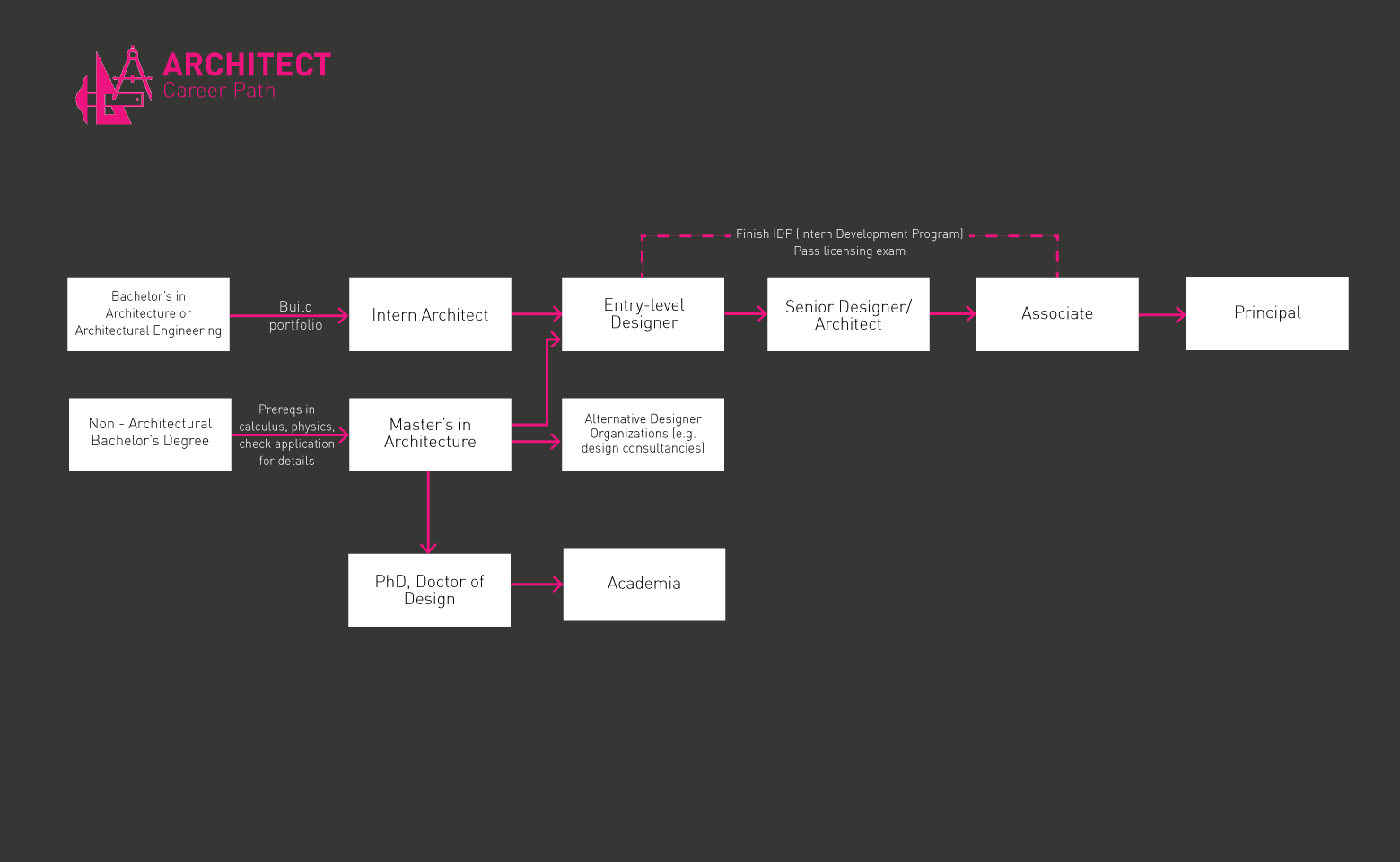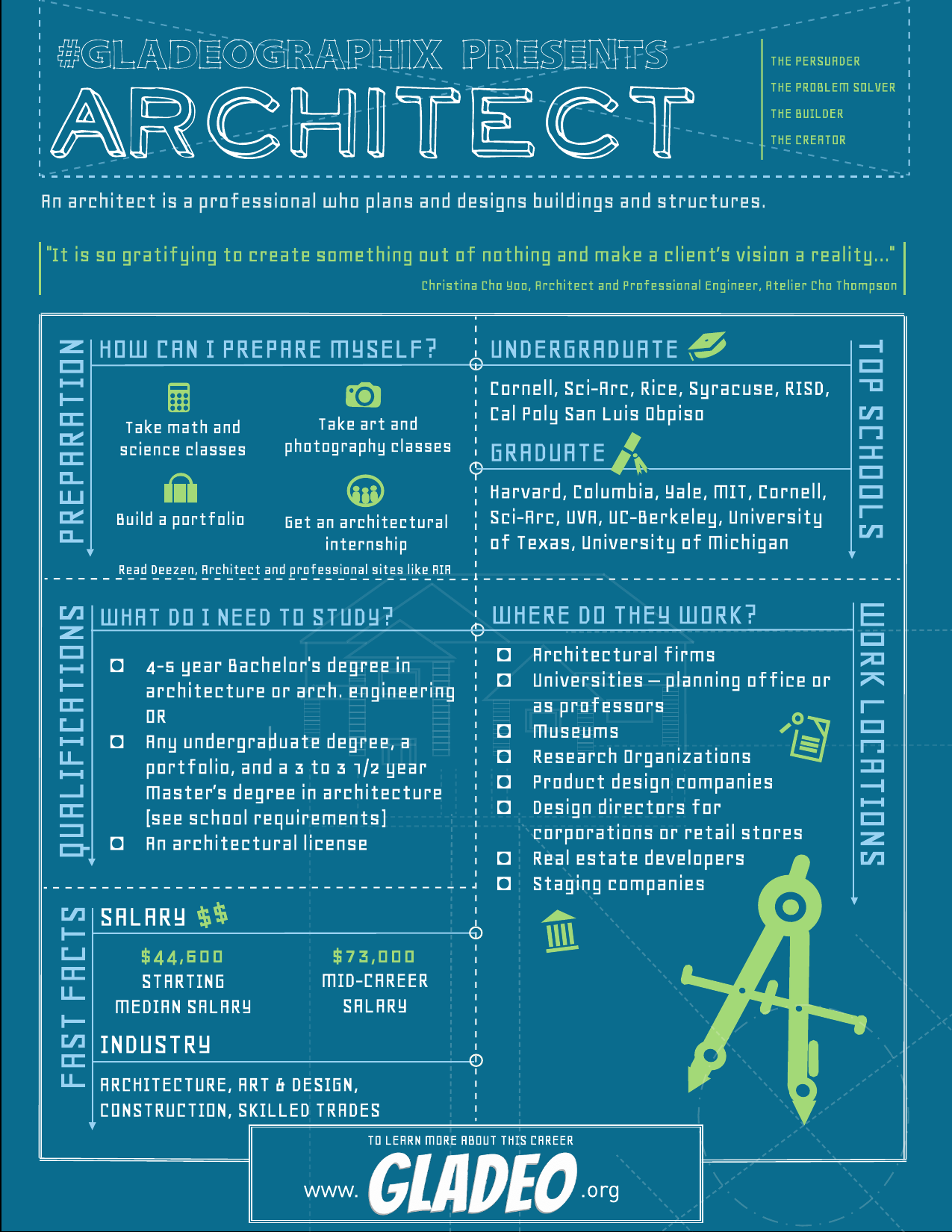聚光灯
Design Architect, Architectural Planner, Project Architect, Specifications Writer, Architectural Engineer
Architects plan and design building and structures, such as private residences, office buildings, theaters, factories, hospitals, and museums.
“Architects are often called upon to bring order to a disparate set up ideas and desires. Designing a building is incredibly complicated and requires the work of many people, sometimes over many years in the context of different economic, social, political forces. In this kind of environment, after sometimes many years of hard work, to see a building you designed come to fruition is so exhilarating. It is so gratifying to create something out of nothing and make a client’s vision a reality in a way that they can not conceive of themselves.” Christina Cho Yoo, AIA, PE, Architect and Professional Engineer, Atelier Cho Thompson
- Architects discuss with clients the objectives, requirements, and budget of a project. In some cases, architects provide various predesign services, such as feasibility and environmental impact studies, site selection, cost analyses and land-use studies, and design requirements. Architects must help conceptualize the program and devise formal solutions for the client.
- In developing designs, architects must create compelling spaces all the while serving a functional need, following building codes, zoning laws, fire regulations, and other ordinances, such as those requiring easy access by people who are disabled.
- Computer-aided design and drafting (CAD) and building information modeling (BIM) technology have replaced traditional drafting paper and pencil as the most common methods for creating designs and construction drawings. Still, being able to sketch is an important skill that architects should cultivate to effectively communicate with clients during meetings or with consultants in systems coordination.
- Architects also may help clients get construction bids, select contractors, and negotiate construction contracts.
- As construction proceeds, architects may visit building sites to ensure that contractors follow the design intent, keep to the schedule, use the specified materials, and meet work-quality standards. The job is not complete until all construction is finished, required tests are conducted, and construction costs are paid.
- Seeks new work by marketing and giving presentations
- Consults with clients to determine requirements for structures
- Estimates materials, equipment, costs, and construction time
- Selects materials and equipment and/or coordinate engineering & specialty consultants to do so
- Prepares, designs, and structures specifications
- Directs workers who prepare drawings and documents
- Prepares scaled drawings of the project
- Prepares contract documents for building contractors
- Manages construction contracts
- Visits worksites to ensure that construction adheres to architectural plans
- Verbal and written communication
- The ability to represent your ideas in diagrams, drawings, renderings, and presentations
- Computer drafting and modeling skills
- Technical understanding of construction and engineering systems
- Architectural firms
- Universities – planning office or as professors
- 博物馆
- Research Organizations
- Product design companies
- Design directors for corporations or retail stores
- 房地产开发商
- Staging companies
- Long Hours: Culturally architects are known to work long hours as they feel like design can always iterate and become better. They also are oftentimes the prime consultant working right under a client on projects, and this role requires them to oversee all other specialty consultants’ work.
- Compensation: Typically, architects do not get compensated to the level that other professionals with a similar amount of schooling may get. However, most architects often say they love how their training affords them to see the world and be creative with whatever task may be put in front of them.
New areas of practice include ideation, design strategy, and public interest design.
- Draw
- Legos
- Daydream
- Make things out of random things
- Interest in different cultures & travel
- As Architecture combines science and art, many Architects complete a 5-year Bachelor of Architecture program
- Note, many colleges offer degrees in Architectural Studies, but they may not be nationally accredited by the National Architectural Accrediting Board (NAAB). As a result, the graduate might have to complete a master’s to qualify for state licensure. The Bureau of Labor Statistics points out that “two-thirds of states require that architects hold a degree in architecture from one of more than 120 schools of architecture accredited by NAAB”
- Apart from a NAAB-accredited degree, students may also pursue a Master of Architecture (M. Arch) or a PhD
- States also require Architect hopefuls to complete a paid internship of up to 3 years, generally with a firm approved by the AXP — Architectural Experience Program (administered by the National Council of Architectural Registration Boards)
- Following the internship, workers must pass the Architect Registration Examination
- The educational requirements never stop, with continuing education needed in most states to maintain licensure. These requirements may include workshops, classes, conferences, and self-study
Getting licensed varies by jurisdiction; however, below are the general steps. For more information about specific jurisdictions, go to NCARB.
- Intern Development Program (IDP)
- Pass ARE (Architecture Registration Examinations) licensing exams
- Get an initial license
- Get certified
- Continuing education requirements
- 1% with High School Diploma
- 5% with Associate’s
- 49% with Bachelor’s
- 32% with Master’s
- 8% with Doctoral/Professional
Some schools are known for being very hands-on about building while others are known to be more conceptual. Some architecture departments are housed in the same building as the landscape architecture, urban design, or art departments. Depending on your personal bent, you should choose a school that suits what kind of architect you would like to be.
Top 10 Architecture Undergraduate Programs for 2018
- 康奈尔大学
- California Polytechnic State University, San Luis Obispo
- 锡拉丘兹大学
- Virginia Tech
- 南加州大学
- 莱斯大学
- University of Texas, Austin
- Southern California Institute of Architecture
- 普拉特学院
- 罗得岛设计学院
Top 10 Architecture Graduate Programs for 2018
- 哈佛大学
- 哥伦比亚大学
- 康奈尔大学
- 耶鲁大学
- 马萨诸塞州理工学院
- University of California, Los Angeles
- 宾夕法尼亚大学
- 加州大学伯克利分校
- 南加州大学
- Washington University, St. Louis
- As soon as you know you’re interested in studying Architecture, start looking at college program requirements. Many schools are competitive and want candidates with sufficient background to succeed in their rigorous courses
- Make sure to lay a strong foundation for your college work by taking high school classes related to art, AP 3D Art and Design, photography, graphic design, math, and physics
- In terms of math, you’ll need to study most of the branches, including geometry, algebra, calculus, and trigonometry. Physics is also crucial for understanding the various forces that come into play
- Don’t wait to get started on a portfolio to show schools and prospective employers. The portfolio doesn’t have to be entirely architecture-related
- For example, to apply to Cornell’s undergraduate program, the requirement is, “The portfolio should contain several examples of freehand drawings including sketches as well as fully developed work. In addition to drawing, a range of artistic media needs to be demonstrated, but each applicant should emphasize the work where their skills and passion are expressed most strongly. Painting, printmaking, sculpture, photography, video, woodworking, and other crafts can convey artistic experience and aptitude.”

- As mentioned in the Education section, Architects must complete a long internship before being eligible to take the Architect Registration Examination and apply for licensure
- Internships are done via the Architectural Experience Program (AXP) administered by NCARB — the National Council of Architectural Registration Boards. AXP “provides a framework to guide you through building competency in a broad range of areas and documenting your work. You can start reporting experience as soon as you graduate from high school.”
- The AXP requires the completion of 3,740 hours of reported work experience along with 96 key skills (falling under six distinct categories) to be developed
- Half of the experience must be gained via practice done under the supervision of a licenced architect (i.e., during the internship, which can last up to 3 years)
- AXP Internships opportunities can be found online via Indeed.com, or by checking out articles such as Black Spectacles’ 5 of the Best Architect Internships You Should Apply to This Summer
- After you’ve completed your internship, passed your Architect Registration Examination, and gained your state licensure, then it’s time to look for positions on job portals such as ZipRecruiter, Indeed, Glassdoor, and others
- There are different types of Architects, such as Technical Architect, Planning Architect, Site Architect, and Design Architect, so look for postings that match your background and qualifications
- Let your LinkedIn network know you’re licensed and looking for openings
- 联系推荐人,询问他们是否愿意推荐您或为您写推荐信
- Create an online portfolio to showcase your work as well as your personality and style
- Before doing interviews, get ready by reviewing Architect Interview Questions and Answers
- Keep abreast of the latest technologies in the industry.
- Attend industry events.
- Keep in touch with your network of designers and architects.
- Keep your LinkedIn profile updated.
- Try to become an expert in a certain type of design or with a certain valuable program.
- Get AIA licensed and LEED accredited
网站
- 美国建筑师协会
- Association of Licensed Architects
- 建筑规范协会
- National Architectural Accrediting Board
- 全国建筑注册委员会
- 美国注册建筑师协会
- 美国绿色建筑委员会
- Organizations: AIA (American Institute of Architects), National Council of Architectural Registration Boards (NCARB), Architectural League of New York, Van Alen Foundation, Storefront for Art and Architecture, Architecture for Humanity
- Blogs: Dezeen, ArchDaily, Archinect, DesignBoom
- Magazines: Architectural Record, Metropolis, Dwell, El Croquis, Detail, Mark, Fine Homebuilding, CLOG, Domus, Casabella, Architectural Review
书籍
- The Language of Architecture: 26 Principles Every Architect Should Know, by Andrea Simitch and Val Warke
- The Architecture Reference & Specification Book updated & revised: Everything Architects Need to Know Every Day, by Julia McMorrough
- ARE 5.0 - Architect Registration Exam Comprehensive Study Guide, by Vadim N Fedorishin
Key transferable skills
- Design thinking – how to systematically and creatively come up with a solution to a problem
- Graphic representation
- 演讲技巧
- How to build things and think through how details may come together
Alternate careers:
- Universities – planning office or as professors
- 博物馆
- Research Organizations
- Product designer, Industrial designer
- Production Designer (film and television sets)
- Design directors for corporations or retail stores
- 房地产开发商
- Staging companies
- Architecture professor
“People often have a love-hate relationship with architecture. Many architects are known to work long hours for less pay than other professionals. Architects like the idea of designing but the realities and challenges of pushing through a project are often grueling and frustrating. However, once those hurdles are overcome and a project is built, there are few things as gratifying as seeing the culmination of many years of hard work right in front of you.” Christina Cho Yoo, AIA, PE, Architect and Professional Engineer, Atelier Cho Thompson
新闻联播

特色工作

在线课程和工具










